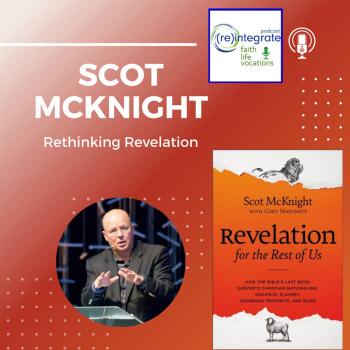 The role of God’s Spirit cannot be ignored in the concept of calling. For if there is a calling, then there is a caller.
The role of God’s Spirit cannot be ignored in the concept of calling. For if there is a calling, then there is a caller.
The problem with false dualism is that what is perceived as the “spiritual” life is disconnected to the actual work humans do as participation in the mission of God. Miroslav Volf contends,
“The sphere of the new creation cannot be tied to the ‘inner man.’ Because the whole creation is the Spirit’s sphere of operation, the Spirit is not only the Spirit of religious experience but also the Spirit of worldly engagement.” (Work in the Spirit)
Volf believes that our understanding of “Spiritual Gifts” needs to be broadened:
“One should not define charisma so narrowly as to include in the term only ecclesiastical activities.”
Are Spiritual Gifts Tests Misleading?
Churches often give “Spiritual Gifts Tests” to their congregants with the intention of helping people find their role in the local church. I’ve done this on a number of occasions in the past. LifeWay Christian Resources has a downloadable “Spiritual Gifts Survey” authored by Gene Wilkes. In its introduction, he writes,
“Ken Hemphill defines a spiritual gift as ‘an individual manifestation of grace from the Father that enables you to serve Him and thus play a vital role in His plan for the redemption of the world.’ Peter Wagner defines a spiritual gift as “a special attribute given by the Holy Spirit to every member of the Body of Christ according to God’s grace for use within the context of the Body.’ I like to use this definition: A spiritual gift is an expression of the Holy Spirit in the life of believers which empowers them to serve the body of Christ, the church.”
Notice that while Hemphil’s definition is broad (he says that spiritual gifts are to “play a vital role in His plan for the redemption of the world”), Wagner’s and thus Wilkes’s definitions are narrowed to the belief that the gifts can only be used within the context of the church. But is this truly the case?
Are Spiritual Gifts Limited to Church Ministry?
Volf points out that biblically, the charisms are not limited to that which is done in the local congregation.
After all, he argues, the gift of an evangelist presupposes action outside the Christian fellowship, and contributing to the needs of the destitute does not cease to be a charisma when it is exercised to non-Christians!
We have grown accustomed to calling human skills, abilities, and knowledge (like crafts, poetry, medicine, etc.) “natural,” while we call certain more sensational gifts “supernatural.” No dichotomy like this is found in the Bible, not in the original Created Order, nor in the New Creation ushered in by Jesus Christ. Volf says that in spite of the fact that in many churches charismatic gifts are still widely believed to be “extraordinary,”
“One of the main points of the Pauline theology of charisms is the overcoming of such a restrictive concentration on the miraculous and extraordinary. For this reason it is of great importance to keep the term charisma as a generic term for both the spectacular and the ordinary.”
Spiritually Gifted to Do Work
Throughout biblical history, there is evidence that humans were spiritually gifted to do work. For instance, Bezalel, Oholiab, and other men were “filled with the Spirit of God, with skill, ability and knowledge in all kinds of crafts”(Exodus 31:1-11 ).
God’s gifts of poetry and song were given to various people, as well as the gifts to interpret dreams and to prophesy. God’s gifts to humans are freely given to his people at various times and in varying degrees.
When Jesus began his ministry, we read that “Jesus returned in the power of the Spirit into Galilee” (Luke 4:14 ). This power healed and cast out demons (Luke 4:31-41). Jesus proclaimed that “if it is by the Spirit of God that I cast out demons, then the kingdom of God has come upon you” (Matthew 12:28). A new day had begun to dawn in the person and work of Jesus Christ.
But this spiritual power not only did these amazing feats, but it also did what we would not normally call “supernatural.” This power anointed Jesus to preach good news to the poor, to proclaim freedom for the prisoners, and to proclaim the year of the Lord’s favor (Luke 4:15-22). Overcoming injustice is not normally seen as “supernatural,” but it is just as much a part of the New Creation as casting out demons.
One of the great promises concerning the New Creation was given by the prophet Joel. “And it shall come to pass afterward, that I will pour out my spirit on all flesh; your sons and your daughters shall prophesy, your old men shall dream dreams, and your young men shall see visions. Even upon the menservants and maidservants in those days, I will pour out my spirit” (Joel 2:28-29). Joel says that when the New Creation begins, God’s spirit will be poured out like never before. Peter announced that Joel’s prophecy was fulfilled when the Holy Spirit was poured out on the church at Pentecost as recorded in Acts 2:16-21.
Natural Supernatural Gifts
In the original Creation, God empowered humans with gifts so that they could do their work. Albert M. Wolters believes that
“the charismatic gifts are not supernatural at all; rather they belong to the nature of God’s good created earth. They are gifts of the Spirit as genuinely as love, joy, and peace are, but they do not add anything to what God had intended for his earthly creation from the beginning.” (Wolters, Creation Regained)
So, even though a new manifestation of the charisms was introduced in the New Testament, spiritual gifts are not peculiar to the New Testament Church but rather they are the redemption of the gifts that God has always intended for humanity. Certainly, in the present age of redemption, the Holy Spirit gives new gifts that are used to edify the church and to proclaim the good news of the Kingdom of God.
But we must remember that. as Wolters writes,
“All human talents and abilities can flourish and blossom under the regenerating and sanctifying influence of the Holy Spirit to the glory and service of God. When opened up by the Spirit they are all charismatic gifts. This applies to social tact, to a way with children, to a knack for communicating, to mechanical skill, or whatever. There may be degrees of importance or splendor in the gifts, but all alike qualify as ‘charismatic’ and ‘spiritual’ if they are directed to Christ’s redemption, sanctification, and reconciliation.”
Therefore, Wolters and Volf are in agreement that the charisms are a part of God’s intention for the original creation, and all the more in the New Creation that came in Jesus Christ. Therefore, local churches should help believers discover and exercise these gifts not only within the context of church ministry but also in their vocations. This means that the Church needs to take seriously the role of the Holy Spirit in congregants’ discerning of their callings.
Image by Karol Franks. Used with permission. Sourced via Flickr.













